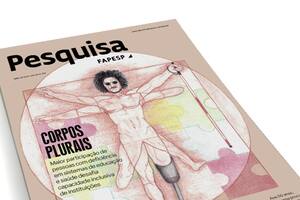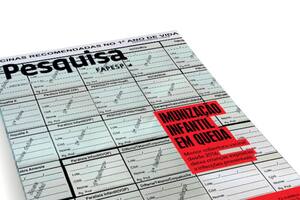Alexandra Ozorio de Almeida - Editor in Chief
Letter from the Editor | 328

Rice, beans, and ketchup
The vigor of Brazilian agriculture is deservedly hitting the headlines: record harvests, increasing productivity, and global leadership in exports of several commodities. Other data showing a less popular agricultural situation, however, do not receive the same attention. The total area used to grow rice and beans — the foundation of Brazil’s national diet — decreased... View Article
LETTER FROM THE EDITOR

Independence and rights
Rape is one of the most violent and abject crimes we face. This type of aggression subjects the victim to a high level of stress that leaves psychological scars and can also cause physiological transformations. A team at the Federal University of São Paulo (Unifesp) that also offers outpatient care researched the impact of sexual... View Article
Letter from the editor | 327

Weights and measures
Everyone knows that drinking too much alcohol is bad for you. But the question that needs to be answered by the authorities creating public policies on the matter is how much is too much? The answer is not simple and often changes in response to new knowledge. In addition to the drink’s alcohol content and... View Article
Letter from the editor | 326

Interaction and inclusion
Anyone who has been for a routine mammogram might have thought to themselves that there is no way a woman invented the exam (and they would be right—it was Uruguayan physician Raul Leborgne [1907–1986] who discovered in the 1950s that compressing the breast tissue generated a better diagnostic image). The procedure saves lives, but there... View Article
LETTER FROM THE EDITOR | 325

Questions and answers
When we decided that ChatGPT would be the subject of this issue’s cover story, we could not resist asking the software to write us an editorial. The response generated by the artificial intelligence (AI) was more like a press release, highlighting the tool’s versatility and potential applications in customer service and education (“offering personalized learning... View Article
LETTER FROM THE EDITOR | 324

Life and death
One topic of frequent animated discussion in the Pesquisa FAPESP newsroom is obituaries. Some are not too fond of this branch of journalism, seeing it as a bit morbid; for others, it is a celebration of life and an opportunity to learn more about inspiring people. As an advocate of the latter, upon reading the... View Article
LETTER FROM THE EDITOR | 323

Science and society
There is growing recognition of the need to bridge the gap between science and society, to find ways of helping the public understand that the production of knowledge is behind everything we do, while at the same time ensuring scientists are aware of societal issues and include them in their research whenever possible. There are... View Article
Letter from the editor | 322

New definitions and diagnoses
What is a museum? The question doesn’t seem particularly difficult to answer. The Merriam-Webster dictionary, for example, describes it as “an institution devoted to the procurement, care, study, and display of objects of lasting interest or value.” The International Council of Museums, based in Paris, has spent the last six years coming up with a... View Article
LETTER FROM THE EDITOR | 321

Deforestation, demarcation, disinformation
Covering climate change in general, and the impact of deforestation of the Amazon specifically, is a difficult task because the news is rarely good. The measurements themselves are not easy to comprehend—ranging from thousands of square kilometers of deforestation to temperature variations of tenths of a degree—and real advances are few and far between. The... View Article
LETTER FROM THE EDITOR

FAPESP, 60 years
It has been nearly three years since the last English edition of Pesquisa FAPESP. The pandemic and consequent suspension of face-to-face activities interrupted our periodic publication of articles originally published in Portuguese, although the English version of our website has been kept up to date (revistapesquisa.fapesp.br/en). Now, we are happy to return with a new... View Article
Letter from the editor | 320

The trauma of sexual violence
Rape is one of the most violent and abject crimes imaginable. It subjects the victim to such a high degree of stress that it results in well-known deep psychological scars, as well as causing physiological impacts. These are the findings of a recent study by a UNIFESP team that combines outpatient care for girls and... View Article
Letter from the editor | 319

Promises in the wind
Electronic cigarettes originally hit the market with the promise of helping smokers kick their tobacco addictions. But the wide range of aromas and types—as to be expected with gadgets targeted at young people—is not suggestive of a treatment method, just as the colorful and flashy stores in countries where they are sold do not bring... View Article
Letter from the Editor | 318

Independence, 200 years later
This issue’s letter from the editor, which usually features on page 7, has been moved to page 71, requiring a somewhat different approach. If the primary objective is to present the issue, what should be said when linear readers are already two-thirds of the way through the magazine? The Pesquisa FAPESP team meets on a... View Article
LETTER FROM THE EDITOR | 317

Expanding concepts
Reflecting systematically on research responsibility is a recent phenomenon in terms of the history of science. It was only at the end of the twentieth century that organized efforts to understand the problem of scientific misconduct began, focusing mainly on plagiarism, fraud, and unethical conduct in experiments on human beings, as well as on how... View Article
LETTER FROM THE EDITOR | 315

Agency in the broadest sense
This May 23, FAPESP celebrates its 60th anniversary. Established in the São Paulo State Constitution of 1947, the São Paulo Research Foundation was founded in October 1960 and began operating a year and a half later. The pioneering institution is the largest state science and research agency in Brazil, serving as a national and international... View Article
Letter from the editor | 313

A worrying drop
After a slow start, Brazil is now one of the top 10 countries with regard to the percentage of the population vaccinated against COVID-19. The country’s National Immunization Program (PNI), managed by the public health system (SUS), offers 29 vaccines as routine, at no cost to the public. The PNI has been so successful that... View Article
LETTER FROM THE EDITOR | 312

Understanding and overcoming obstacles
The knowledge gained from scientific research can improve the quality of life of individuals and social groups, but it is not always effectively or quickly adopted—more so with procedures and methods than equipment and drugs. There are many obstacles, including ignorance, habit, lack of training, absence of rules, and cultural resistance. The problem can occur... View Article
Letter from the editor | 311

Theater demonstrations
Brazilian rapper Emicida recorded a show at the Municipal Theater of São Paulo for the documentary AmarElo – É tudo para ontem (“It’s all for yesterday”). The musician chose the theater—where a 1922 exhibition known as Modern Art Week demanded greater Brazilian contribution to art—as his stage to talk about Afro-Brazilians who have played a... View Article
Letter from the editor | 310

Capturing subtleties
Brazil is known for producing more clean energy than the average country. In 2019, 46% of its electricity came from low-carbon sources, compared to 16% worldwide (and 26% in Europe). The majority of this renewable, nonpolluting energy is produced by more than 200 hydroelectric power plants that generate two-thirds of the electricity consumed nationwide. The... View Article
Letter from the editor | 309

Coffee, wine, açaí
It has long been known that local soil and climate characteristics, combined with cultivation and manufacturing techniques, result in unique attributes for certain agricultural or food products. There are records of this dating back to the fifth century BC, such as references to wine from the Greek island of Chios, considered a luxury item in... View Article
Letter from the editor | 308

Diversity
The idea of using criteria for spaces on higher education courses based on anything other than performance may seem incompatible with scientific work. Conceptually, science has no color, gender, age, or any other characteristic, but it is a social activity, and we live in an unequal society. Thinking of ways to ensure equal access to... View Article
Letter from the Editor | 307

Unequivocal demonstration
Unequivocal. That is how the sixth report by the UN’s Intergovernmental Panel on Climate Change (IPCC) described humanity’s influence on the warming of the atmosphere, ocean, and land. The first part of the latest report summarizes 14,000 recent scientific studies on the issue. There was nothing incidental about the choice of words: the IPCC precisely... View Article
Letter from the Editor | 306
At a crossroads
The eastern Amazon is no longer a carbon dioxide sink and is now a source of this greenhouse gas, according to a recently published study. Confirming previous, less comprehensive data, the research sought to measure the carbon balance in areas of the Amazon suffering varying levels of deforestation, wild fires, and climate change. The results... View Article
Letter from the Editor | 305

No census
Every 10 years, IBGE researchers visit every household in Brazil to carry out the national census, collecting demographic and socioeconomic data on the country’s inhabitants. Brazil’s first census took place almost 150 years ago, at a time when one of the questions was whether the individual was free or enslaved. It is the main source... View Article
Letter from the editor | 304

A bleak outlook
On January 15, 1951, Brazilian President Eurico Dutra passed Law 1310, establishing what was at the time called the National Research Council (CNPq). The law’s first article outlined the council’s purpose: “to foster and stimulate the development of scientific and technological research in all fields of knowledge.” Almost six months later, on July 11, CAPES... View Article
Letter from the editor | 303

Education is not a privilege
One of the lasting impacts of the novel coronavirus pandemic relates to an essential area for all nations: education, which is fundamental to the future of developing countries like Brazil. In addition to the already high number of 1.3 million children and teenagers not enrolled in education in Brazil, a further 4 million students have... View Article
Letter from the editor | 302

Principles and decisions
Viruses are simple but sophisticated organisms. They have no efficient mechanism for correcting genetic errors that occur during replication, meaning that changes to their genome are incorporated into future generations. These mutations can be harmless, or they can make the virus more efficient—which is all the more undesirable when humans are the hosts. A year... View Article
Letter from the editor

Stolen heritage
Illegal fossil extraction is poorly reported and a more common problem than you would think. Developing nations whose soils are rich in prehistoric records often suffer from limitations such as insufficient security and oversight, leading to increased smuggling of valuable artifacts, which frequently end up in the hands of private collectors or even in museums.... View Article
Letter from the editor | 300

Numbers
With the second most COVID-19 deaths in the world, Brazil has already surpassed 200,000 victims of the disease. The figure could be much lower if preventive measures proven to be effective were more widely followed, such as social distancing, the use of masks, and strict hygiene practices. It is equally undeniable that the number could... View Article
Letter from the editor | 299
Take care
Surgeon Angelita Habr-Gama has dedicated her career to developing treatment strategies that aim to prevent rectal cancer patients from needing to have the organ removed. The results of research carried out by her group since the 1990s were published last month, showing that patients need not undergo a proctocolectomy if the tumor regresses completely after... View Article